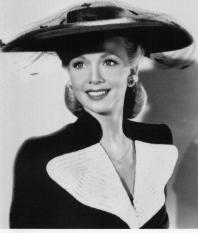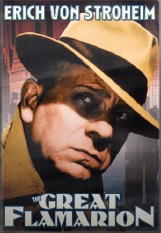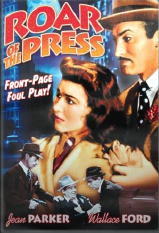Sun 4 Mar 2007
HAVING WONDERFUL CRIME. RKO, 1945. Patrick O’Brien, George Murphy, Carole Landis, George Zucco. Co-screenwriter: Stewart Sterling; directed by A. Edward Sutherland.
Based on the novel of the same name by Craig Rice, which I haven’t read, but all the sources which I have read say that the movie is nothing at all like the book. Murphy and Landis play the newly wed Jake and Helene Justus, while O’Brien is their long-suffering buddy in crime-solving, lawyer Michael J. Malone. (It was John J. Malone in the books. That much I do know.)
The story has something to do with a magician who disappears in the middle of his stage act, then reappears in a trunk brought to a lakeside resort by his female assistant – or does he? In spite of the trio’s suspicions, he’s not in the trunk, but not to worry – he eventually turns up dead and there really is a case to be solved.
I couldn’t tell you one way or another if the plot (the motive and where the body is when) makes any sense, and truthfully I don’t think that anyone involved in this madcap sort of affair, near slapstick at times, really cared.
Pat O’Brien doesn’t nearly match the image of Malone I have in my head – for some reason, I see him as a shorter, more somber sort of fellow – but George Murphy is right on as Jake Justus, and Carole Landis is even more perfect as Helene. Her beautiful, smiling face, her lithesome figure and (as Helene) her slightly scatterbrained approach to life and solving murder mysteries, makes me wonder why her career in the movies never went any further than it did. (Due to illness, among other factors, she committed suicide only three years after this movie was released.)

Even though from a murder mystery point of view there is much to be desired from this particular film, the performances of the three main characters make this a must-see, especially to watch Miss Landis in such high form, high spirits and in high fashion.
THE GREAT FLAMARION. Republic, 1945. Erich von Stroheim, Mary Beth Hughes, Dan Duryea, Stephen Barclay. Directed by Anthony Mann.
A curiously flat film noir with oft-time director Erich von Stroheim as Flamarian, a vaudevillian headliner who falls for the wiles of femme fatale Mary Beth Hughes, an assistant in his pistol markmanship act. Her husband, Dan Duryea, is the other assistant in the act, a man driven to jealousy and as a consequence, given heavily to drink.
Flamarion is a stolid, impassive, lonely man, once thrown over in love by a double-crossing woman, who’s vowed to never allow it to happen again. Contemptuous, however, of the weakness he sees in Al Wallace and tempted by the flirtatious Connie Wallace, he at length lets his guard down, to his own disaster – and as it happens, to the others in this ill-fated triangle.

The long scene during which Flamarion waits for Connie in a hotel bridal suite in buoyant anticipation, only to realize the inevitable, is as painful to watch as anything I’ve seen in a film in some time. Duryea is perfectly cast in his role, slickly conniving yet weak-kneed and a somewhat pitiful excuse for a man – a fact that the viewer is quickly made aware of. It’s a part made just for him.
I don’t believe I’ve seen Mary Beth Hughes in a movie before, although she was around throughout the 1940s in B-movies like this, though often in uncredited performances. Her body language in the role was as crucial as her spoken dialogue, and she made the best of both.
But the reason I called the film flat? The main story is presented in the form of a long, uncomplicated flashback. When you know the fate of two of the characters from the beginning, and you can soon guess that of the third, it’s just about impossible for any movie or any director or any cast to generate a feeling of suspense, and The Great Flamarion is no exception.
On the other hand, if it had been filmed linearly, which would have been the only alternative, there simply aren’t enough twists and turns in the plot for the otherwise lightweight tale to have gone anywhere at all. Mann made the best of two choices, in my opinion, but in spite of some more better than average performances from the players, the movie didn’t ring any bells for me.
ROAR OF THE PRESS. Monogram, 1941. Wallace Ford, Jean Parker, Jed Prouty, Paul Fix. Directed by Phil Rosen.
What this Grade B murder mystery movie is more than it is a murder mystery is a comedy about crime beat newspapermen and their wives who never see them. Wallace Ford is the reporter (Wally Williams) who spots a body falling from the top of a Manhattan skyscraper on the day and his bride of one day come to the city to spend a few days honeymooning. Jean Parker, of Detective Kitty O’Day fame (in certain circles), is his bride Alice, who hails from a small town in New England and who quickly joins the club – that of the long-suffering wives of the other reporters on her husband’s newspaper.

Dead is the head of a pacifist league, in case it matters, and it doesn’t much, which turns out to be a front for fifth columnists and saboteurs. When Wally finds yet another body before the cops do, the cops get sore, and rightfully so, as all of the clues are in the pockets of Wally. Jed Prouty plays Wally’s editor, who cleverly keeps him on the case, even with the lure of a dinner of corned beef and cabbage waiting for him at home. One would think that the slim and decidedly pretty Mrs. Williams would be lure enough, but not so.
Paul Fix is the head of a numbers racket with a heart of gold, and thereby saves the bacon of both Mr. and Mrs. Williams when the gang of bad guys start to get overly worried about what Wally knows, which truthfully is very little, even with the clues he obtained before the police did.
As for director Phil Rosen, who later directed a number of Charlie Chan films, he makes the best of also truthfully very little, and the result is surprisingly entertaining.
March 5th, 2007 at 3:37 pm
[…] Speaking of mystery movies, as I was not too long ago, Turner Classic Moviesis having a special on them this month — a total of no fewer than 53 of them are going to be shown on Tuesdays and Wednesdays during the month of March. Make sure your Tivo’s and (if need be) old-tech VCR’s are ready for these: Five “All-Star Classics” (including The Maltese Falcon, of course) […]
April 9th, 2007 at 8:43 am
[…] I reviewed Anthony Mann’s The Great Flamarion (Republic, 1945) earlier this year, a movie considered by some to be in the noir genre, so Desperate is far from being the first that he directed in the category, but to me, both seem flawed. Neither seems to me to epitomize in their entireties what a noir film truly is (or was). […]
February 11th, 2010 at 8:22 pm
[…] TV series (1958-63). Pat O’Brien had a huge career, including Angels with Dirty Faces (1938), Having Wonderful Crime (1945, as Michael J. Malone), Crack-Up (1946), Riffraff (1947), the failed pilot for The Adventures […]